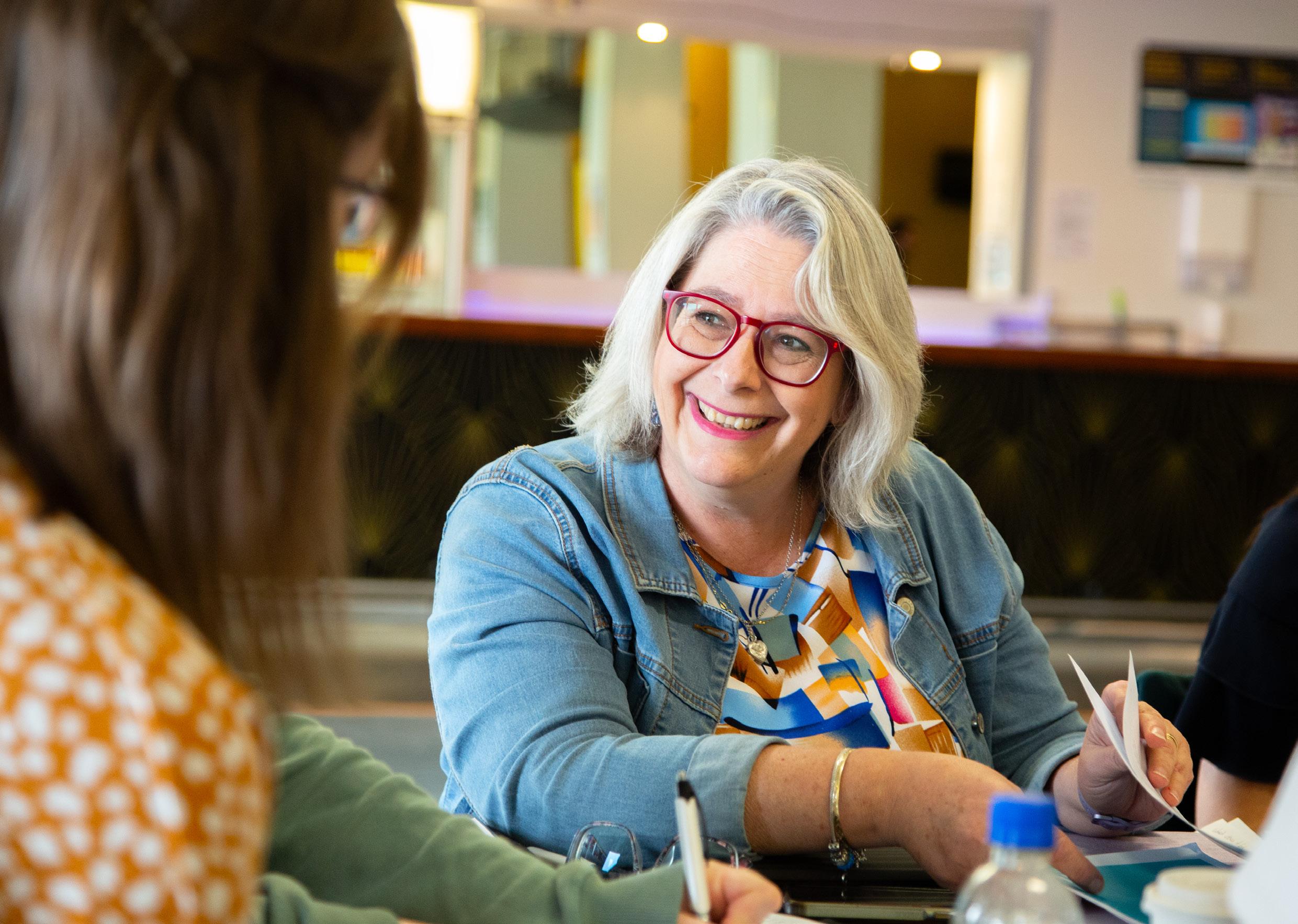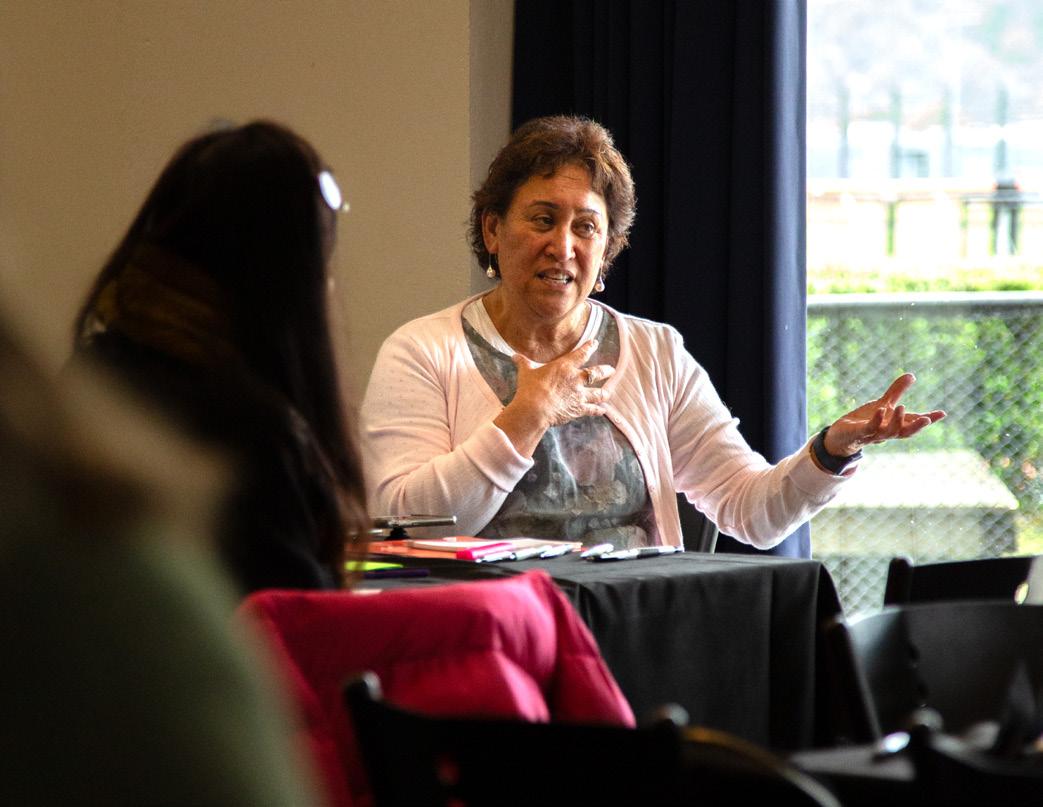
6 minute read
Shaping stronger mentoring through data and dialogue
A new mentoring model is helping educators across Aotearoa build stronger professional relationships, deepen cultural responsiveness and grow their own capability. Te Poipoi Kaiako Mentor Support Programme centres mentors in the learning process using data, feedback and collaboration to shape a more resilient and confident teaching workforce.
Te Poipoi Kaiako Mentor Support Programme, funded by the Ministry of Education and provided by Tātai Aho Rau Core Education, is redefining mentoring across Aotearoa by placing mentors at the centre of their own professional learning.
Through data-informed design and collaborative development, the programme is building a more confident, culturally responsive teaching workforce.
Mentoring is often seen as a support role, something done quietly alongside teaching. But Te Poipoi Kaiako flips that narrative, recognising mentoring as a leadership capability. It positions mentors as professionals who deserve their own space for growth, reflection and connection.
The programme’s design is grounded in evidence: national and international research, sector-wide
feedback, and cultural frameworks such as Tātaiako and Tapasā.
It also draws on Teaching Council documents including Our Code, Our Standards and the Guidelines for induction and mentoring and mentor teachers.
Facilitators use a Theory of Change model: if mentors are supported through culturally grounded, relational and practical PLD, they will feel more confident and capable. This leads to stronger mentoring practices and better outcomes for new teachers.
Feedback is gathered at every stage through surveys, focus groups, interviews and analytics from the Ministry’s Education Learning Management System. This data informs everything from the order of learning modules to the content of workshops.
For example, wellbeing was elevated to the top of the programme’s kaupapa after participants identified it as a foundational priority, while curriculum design was reframed as designing learning experiences to better reflect educators’ needs.
Mentors say the programme is “rooted in support and relationships” and value the chance to exchange strategies, ideas and resources with others.
One SCT describes her approach as “working within a team, guiding a team and empowering a team,” while others highlight the tuakana-teina approach as “really empowering.”
Helen, a mentor from Queen’s High School, says the programme has helped her apply new learning across her teaching and relationships.
“This course highlights the importance of continual growth and the importance of collaboration.”
Kayla from Wānaka echoes this, saying, “Everything I’ve learned is as much of a reminder for my own personal growth skills as it is for growing the skills for other kaiako through mentoring.”
Mentoring across diverse contexts
Data from the programme reveals distinct mentoring patterns across sectors. In secondary schools, uptake is high due to structured frameworks and roles like the specialist classroom teacher (SCT).
These schools often have layered support systems, with mentees accessing guidance from subject mentors, SCTs and heads of department.
Helen, who mentors seven provisionally certified teachers (PCTs), meets with them all once a week, with one-on-one meetings at least fortnightly.
“I do observations and have conversations with the LA mentors to monitor how PCTs are going in the classroom.”
In primary schools, mentoring is often less formalised. Jan from Redwood Primary notes that her role as a learning support coordinator allows her to regularly check in with her mentee throughout the day, creating space for informal but meaningful support.

She says being able to drop in for a chat or respond quickly when something is “not quite right” helps her offer timely, effective support.
In early childhood education (ECE), mentoring often falls to centre managers or head teachers, who juggle multiple responsibilities. Courtney from FamilyTies preschool describes how mentoring is embedded in her team’s culture.
“Mentoring is empowering my mentee through observations of their work and ensuring space to try new things before coming together and reflecting for growth for both of us.”
Rural ECE services face additional challenges accessing face-to-face PLD due to distance and resource constraints. In response, Te Poipoi Kaiako introduced online modules and webinars to improve access and equity.
Jan shares that while it initially took time to navigate the Education Management site, she now enjoys completing the programmes and using the resources to support her mentee’s registration journey.
Others say the collaborative PLD workbook and online study options have been invaluable, particularly for fitting professional learning into busy schedules.
Courtney adds that the programme has helped her broaden her perspective.
“This programme has encouraged me to widen my view on education from other sectors and strengthened the relationship between me and my mentee.”
“It was a great refresh and a reminder of the importance of pepeha, whanaungatanga and manaakitanga to create a strong foundation for professional learning relationships,” adds Jan.

Relational practice and reflective growth
Mentors describe the programme as empowering, inclusive and transformative. The tuakana-teina approach fosters reciprocal learning and relational values like whanaungatanga and manaakitanga are woven throughout.
Reflection tools and workbooks help mentors link their practice to the Standards, while webinars and workshops offer space to share strategies and build networks.
One mentor shares how noticing a shift in their mentee’s āhua (disposition, attitude) led to a timely hui and meaningful support, highlighting the importance of relational awareness in mentoring.
Courtney says the programme prompted her to reflect more deeply on Te Tiriti o Waitangi.
“The programme has encouraged me to reflect on Te Tiriti within our documents, not just in my mentorship but also in my practice as a whole.”
Helen reflects on the reciprocal nature of mentoring.
“I wish I had done mentoring earlier in my life. I’ve learnt as much from beginning teachers as they have from me.”
Several mentors say the experience has refreshed their awareness of beginning teachers’ needs, encouraged them to “keep the space available” for their mentees and given them renewed confidence to support evidence gathering for certification.
Kayla adds she is taking some ideas back to her team and bringing more next time, noting that it will be empowering for her colleagues too.
Others highlight the benefit of hearing “different ways of doing things, new ideas, possibilities,” with one participant saying they feel “affirmed as a member of the teaching profession” and inspired by a programme that caters to early learning, primary and secondary – “not an easy feat.”

Evolving with the sector
Te Poipoi Kaiako is designed to adapt. Facilitators use real-time feedback to respond to emerging needs, such as workload pressures and support for neurodiverse learners.
Online workshops were introduced in response to requests from remote participants, and resources are regularly updated to align with sector changes, including the upcoming Teaching Standards (2026–2027).
Future developments include exploring sector-specific mentoring strategies, deeper analysis of resource use and a proposed two-day programme bringing Pou Tautoko and Pia together at the start of the year.
The programme’s collaborative nature ensures it continues to evolve. Facilitators draw on their diverse experience and participant feedback to refine resources and align with national priorities.
Peer discussions at workshops surface emerging needs, and cross-sector collaboration strengthens inclusivity and relevance.
Courtney says the programme’s format made her feel supported and encouraged.
“I have enjoyed the whanaungatanga and feel supported with how this was presented in a format which was not overwhelming.”










